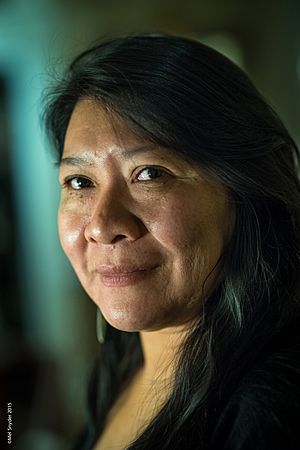Joênia Wapixana facts for kids
Quick facts for kids
Joenia Wapixana
OMC
|
|
|---|---|
 |
|
| Chair of the National Indigenous People Foundation | |
| Assumed office 2 January 2023 |
|
| President | Luiz Inácio Lula da Silva |
| Minister | Sônia Guajajara |
| Preceded by | Marcelo Xavier |
| Member of the Chamber of Deputies | |
| In office 1 February 2019 – 2 January 2023 |
|
| Constituency | Roraima |
| Personal details | |
| Born |
Joênia Batista de Carvalho
20 April 1974 Boa Vista, Roraima, Brazil |
| Political party | REDE (2017–present) |
| Alma mater |
|
| Occupation | Politician, attorney |
| Known for | First Indigenous attorney in Brazil, first Indigenous attorney to argue before the Brazilian Supreme Court, and first Indigenous woman deputy elected to Brazilian National Congress |
Joenia Wapixana (born Joênia Batista de Carvalho on April 20, 1974) is a very important person in Brazil. She is the first Indigenous lawyer in the country and belongs to the Wapixana tribe from northern Brazil. She made history by being the first Indigenous lawyer to speak in front of Brazil's highest court, the Supreme Court of Brazil. This happened when she took a land dispute case to an international human rights group.
Joenia Wapixana was also the first Indigenous woman to be elected as a federal deputy, which is like a representative in the Brazilian Congress. She represented the state of Roraima from 2019 to 2023. Since January 2023, she has been the president of the National Indigenous People Foundation (FUNAI), an important organization that works to protect the rights of Indigenous peoples in Brazil.
Early Life and Education
Joenia Wapixana grew up in the Brazilian state of Roraima. Her family lived in small villages in the Amazon rainforest. In these villages, people often followed traditional ways of life. Many elders did not even speak Portuguese, the main language of Brazil. When Joenia's parents registered her birth, a clerk gave her the official name Joênia Batista de Carvalho. However, she prefers to be known by her first name and her tribe, Joenia Wapixana.
When Joenia was about seven or eight, her father left the family. Her mother then moved to the state capital, Boa Vista, to find work. Joenia and her siblings went to school there. While her older brothers left school to work, Joenia finished high school in the early 1990s. She first thought about becoming a doctor. However, she decided to study law instead, which was unusual for educated Indigenous women at the time. She worked at night in an accounting office to pay for her studies. In 1997, Joenia graduated from the Federal University of Roraima. She became the very first Indigenous lawyer in Brazil.
Fighting for Indigenous Rights
After becoming a lawyer, Joenia Wapixana started working for the Indigenous Council of Roraima (CIR). This group helps Indigenous communities. In 2004, she took a big step by asking the Inter-American Commission on Human Rights for help. She wanted the Brazilian government to officially mark the borders of the Raposa Serra do Sol Indigenous Territory. This land is the traditional home of several Indigenous groups, including the Wapichana people.
In 2005, Brazil's Supreme Court agreed to protect the Raposa Serra do Sol lands. They said it was an environmental area where Indigenous rights were protected by the constitution. However, problems continued with people like loggers and miners on the land. In 2008, Joenia Wapixana made history again. She became the first Indigenous lawyer to argue a case in front of the Supreme Court. The case was about whether the government could divide the Raposa Serra do Sol lands into smaller pieces. Joenia argued that the constitution protected these lands as a whole for Indigenous peoples. On March 19, 2009, the Supreme Court agreed with her. They voted to confirm that Indigenous peoples had the exclusive right to use the Raposa Serra do Sol reserve lands.
In 2013, Joenia was chosen to be the first president of a new group called the National Commission for the Defense of the Rights of Indigenous Peoples. This group was created to watch over laws that might affect Indigenous rights. Its job is to support and get involved in legal cases that impact Indigenous peoples.
Awards and Recognition
Joenia Wapixana has received several important awards for her work.
- In 2004, she received the Reebok Human Rights Award.
- In 2010, the Brazilian government honored her with the Ordem do Mérito Cultural, which is a cultural merit award.
- In 2018, she was given the United Nations Prize in the Field of Human Rights. This award recognizes people who have made outstanding contributions to human rights.
See also
 In Spanish: Joênia Wapichana para niños
In Spanish: Joênia Wapichana para niños

